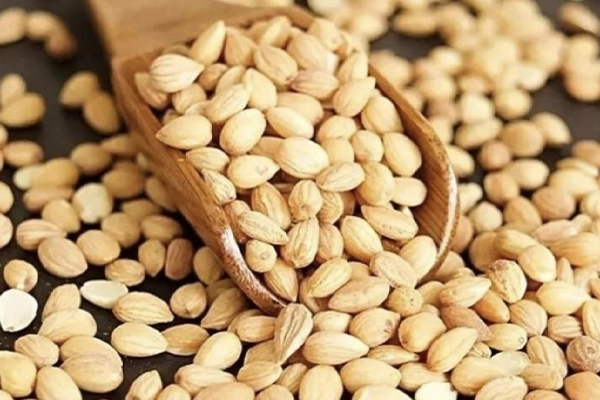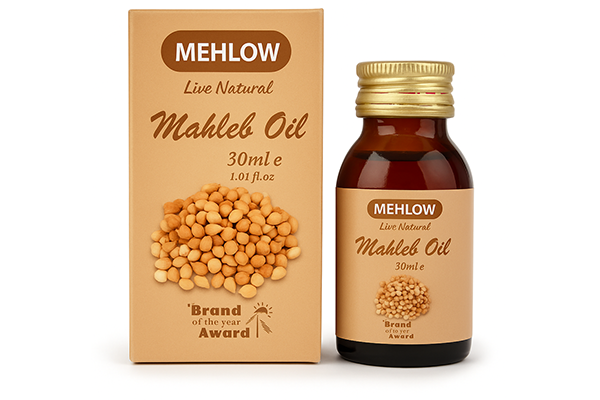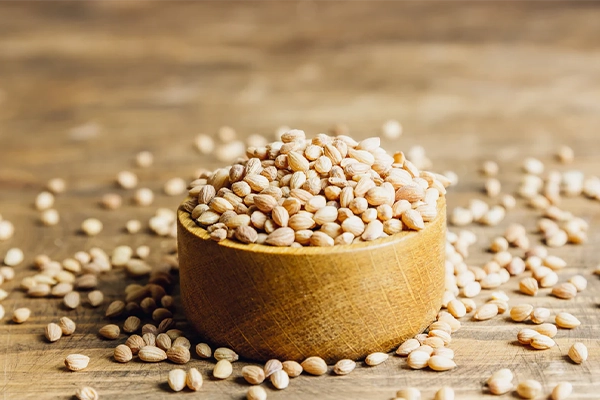Mahleb health benefits go far beyond flavor. This traditional spice contains nutrients and natural compounds that may support digestion, reduce inflammation, and promote overall wellness.
Introduction
While often known for its delicate aroma in sweet breads and desserts, Mahleb is also a seed rich in history and healing. Used in Middle Eastern and Mediterranean cultures for centuries, it has recently gained attention in the world of functional nutrition.
The growing interest in Mahleb nutrition comes from its impressive mix of plant compounds, essential oils, antioxidants, and minerals. As people search for more natural ways to stay healthy, the benefits of Mahleb seed are being rediscovered by chefs, herbalists, and health-conscious consumers alike.
More than just a spice, it represents a link between traditional wisdom and modern wellness. In this article, we’ll explore exactly what makes Mahleb a valuable addition to your diet — from its nutritional makeup to its therapeutic effects.
The Origins of Mahleb as a Medicinal Ingredient
The story of Mahleb goes far beyond its culinary charm. For centuries, this seed has been revered in traditional medicine across Persia, the Levant, Anatolia, and parts of Southern Europe. Long before it was ground into spice jars in modern kitchens, Mahleb was considered a natural remedy — valued for its ability to soothe the body, boost energy, and restore balance.
Historical texts and oral traditions from ancient Iranian and Arabic herbal medicine describe Mahleb as a warming ingredient used to treat everything from indigestion and fatigue to respiratory discomfort and joint stiffness. Often steeped in warm water or ground with honey and herbs, the kernel was administered in small amounts as a daily tonic.
In Armenian and Greek cultures, Mahleb was not only added to ceremonial breads but also prescribed in postpartum recovery treatments and seasonal cleanses. Its bitter undertones were believed to stimulate digestion, cleanse the liver, and invigorate blood circulation.
The enduring use of Mahleb in wellness rituals reveals the deep respect that earlier civilizations had for its healing properties. Even in pre-modern apothecaries, kernels of this cherry seed were dried and stored among other prized botanicals. These early traditions laid the foundation for our current understanding of Mahleb health benefits and its potential role in functional nutrition today.
As we look deeper into Mahleb nutrition, we begin to see how science is slowly catching up with what ancient healers already knew — that this seed, though small, holds a rich legacy of natural healing.
Mahleb Nutrition Breakdown
To understand why this seed is gaining global attention, we need to look closely at Mahleb nutrition. Packed with essential vitamins, minerals, and plant-based compounds, Mahleb is much more than a simple flavoring agent — it’s a nutrient-rich ingredient that contributes to overall health and vitality.
Key Nutrients Found in Mahleb:
- Proteins and Healthy Fats:
Mahleb contains plant-based proteins that aid muscle health, as well as monounsaturated fats which support heart and brain function. - Vitamins:
It’s a source of vitamins such as Vitamin E, known for its antioxidant properties, and Vitamin C, which boosts the immune system. - Minerals:
Rich in calcium, magnesium, and iron, Mahleb helps maintain strong bones, improve blood circulation, and support energy production. - Dietary Fiber:
The seed provides natural fiber that aids digestion, promotes gut health, and helps regulate cholesterol levels. - Antioxidants:
Compounds like coumarin and phenolic acids in Mahleb help reduce oxidative stress and combat free radicals.
Why This Matters:
The unique benefits of Mahleb seed stem from its combination of nutrients that not only enhance flavor but also contribute to long-term wellness. This nutritional profile explains why Mahleb health benefits have been recognized in both traditional and modern wellness practices.
By incorporating Mahleb into your diet — even in small amounts — you’re adding a natural source of antioxidants and minerals that work together to promote overall health.
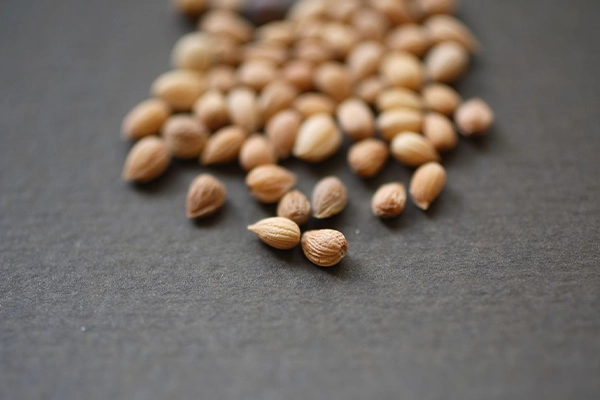
Digestive Health Benefits
Among the most well-known Mahleb health benefits, its positive impact on digestion has been recognized for generations. In traditional herbal medicine, this seed has long been used to relieve stomach discomfort, reduce bloating, and improve nutrient absorption.
The natural fiber content found in Mahleb helps regulate bowel movements and supports a balanced gut microbiome. Fiber not only promotes digestive regularity, but also acts as a prebiotic — feeding the beneficial bacteria in the intestines, which are essential for a strong immune system and proper nutrient metabolism.
Mahleb also contains bitter plant compounds that stimulate the production of digestive enzymes. This can help the body break down food more efficiently, especially after heavy meals. That’s why, in some cultures, ground Mahleb is mixed with honey or warm water and taken as a post-meal digestive tonic.
Its anti-inflammatory properties further aid the gastrointestinal tract by soothing irritation, particularly in those with sensitive digestion or conditions like gastritis. As part of a balanced diet, small daily doses of Mahleb may offer long-term support for gut health.
When evaluating Mahleb nutrition, it’s clear that its digestive effects are not just anecdotal — they’re supported by the presence of fiber, essential oils, and plant-based antioxidants.
Whether consumed in baked goods, herbal teas, or traditional spice blends, the benefits of Mahleb seed on the digestive system make it a valuable addition to any wellness-focused lifestyle.
Anti-Inflammatory and Pain Relief Properties
Another valuable aspect of Mahleb health benefits lies in its natural anti-inflammatory potential. For centuries, Mahleb has been used in traditional remedies to reduce swelling, alleviate pain, and calm internal irritation — especially in joints, muscles, and the digestive tract.
The seed contains plant-based compounds such as coumarin and flavonoids, which have been associated with inflammation control in both historical medicine and preliminary scientific research. These compounds work by neutralizing free radicals in the body and reducing oxidative stress — one of the main triggers of chronic inflammation.
In cultures where Mahleb has long been used, people would grind the kernel and combine it with warm herbal infusions to relieve pain from arthritis, rheumatism, and muscle tension. The seed’s warming properties were believed to stimulate blood circulation, helping to reduce stiffness and promote relaxation.
Recent studies on traditional botanical medicine support the idea that regularly consuming natural ingredients like Mahleb may help manage inflammation over time. This is especially useful for individuals dealing with inflammatory digestive conditions, joint pain, or post-exercise soreness.
As more people turn toward natural and functional foods, understanding the benefits of Mahleb seed in reducing inflammation becomes increasingly important. While it should never replace medical treatments, Mahleb offers gentle support as part of a healthy, balanced lifestyle.
Its inclusion in daily meals — whether through spice blends, warm teas, or baked goods — can provide a small but meaningful contribution to the body’s anti-inflammatory defense system, making it a quiet ally in everyday wellness.
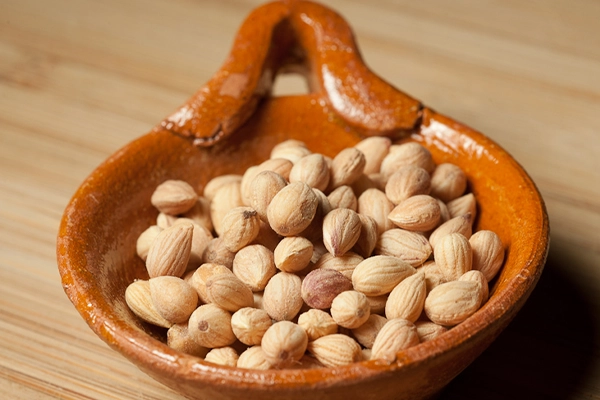
Heart and Circulatory System Support
One of the lesser-known but increasingly appreciated Mahleb health benefits is its potential role in supporting cardiovascular health. This aromatic seed offers a combination of nutrients and compounds that may contribute to better heart function and improved blood circulation.
At the core of its cardiovascular benefits are its healthy fats, particularly monounsaturated fatty acids, which have been linked to lower LDL (bad) cholesterol and higher HDL (good) cholesterol. A diet rich in such fats may help reduce the risk of heart disease over time.
Additionally, Mahleb nutrition includes minerals like magnesium and potassium, both of which play vital roles in maintaining normal blood pressure levels and regulating heart rhythm. These nutrients also support the relaxation of blood vessels, which contributes to smoother circulation throughout the body.
The seed also contains natural antioxidants such as coumarin, which may prevent the oxidation of cholesterol in arteries — a key factor in reducing arterial plaque buildup. This antioxidant action helps protect the vascular system from long-term damage and contributes to overall heart resilience.
Traditional Persian and Mediterranean diets, which sometimes include Mahleb in sweet or savory dishes, have long emphasized the role of spices and seeds in maintaining a healthy heart. Modern functional food research is beginning to validate these historical practices, especially as people look for plant-based, whole-food solutions to support cardiovascular wellness.
By incorporating small amounts of Mahleb into your diet, you not only add a touch of flavor but also introduce benefits of Mahleb seed that may help your circulatory system perform at its best.
Bone Health and Mineral Balance
When it comes to maintaining a strong skeletal system, Mahleb health benefits extend well beyond digestion and flavor. This seed is a natural source of essential minerals that play a critical role in supporting bone density, muscle function, and long-term joint health.
Among the most valuable nutrients found in Mahleb nutrition are calcium, magnesium, and phosphorus — three key minerals directly involved in building and preserving bone tissue. Calcium is the foundational mineral of bones and teeth, while magnesium helps regulate calcium absorption and supports muscle coordination and nerve signaling.
In addition, Mahleb provides iron, which is essential not just for red blood cell production, but also for oxygen delivery to bone marrow and muscle tissue. A well-oxygenated musculoskeletal system helps reduce fatigue and promotes tissue repair, especially after physical activity or injury.
Traditional herbalists often recommended Mahleb seed powder for individuals recovering from bone fractures or experiencing age-related bone weakening. Its warming nature was believed to support circulation and nutrient delivery to skeletal tissues — a perspective now echoed by modern views on mineral bioavailability.
While Mahleb is not a substitute for calcium supplements or professional medical treatment, its inclusion in the diet can support a balanced mineral intake through natural means. When combined with other whole foods and physical activity, the benefits of Mahleb seed for bone health can contribute to a strong and resilient body structure.
For those seeking to enhance their overall mineral profile with plant-based sources, Mahleb offers a gentle but effective boost — one that reflects both tradition and modern nutritional wisdom.
Mahleb as a Natural Antioxidant
One of the most valuable Mahleb health benefits lies in its antioxidant content. Antioxidants are natural compounds that help protect the body from oxidative stress, which occurs when harmful molecules known as free radicals accumulate and damage cells. Over time, this damage can contribute to chronic conditions such as heart disease, diabetes, and premature aging.
Mahleb nutrition includes several bioactive substances with antioxidant properties, most notably coumarin and phenolic acids. These compounds work by neutralizing free radicals, reducing inflammation, and supporting the body’s natural detoxification pathways.
In traditional medicine, Mahleb has been used not just for flavor, but also to support general vitality and resilience — qualities often attributed to its antioxidant effects. People would consume Mahleb in teas, spice blends, or sweet pastes during seasonal transitions, illnesses, or recovery periods to strengthen the body’s defense system.
Modern nutritionists now recognize the role of plant-based antioxidants in maintaining cellular health, boosting the immune system, and slowing the aging process. While Mahleb is not as widely studied as turmeric or green tea, its traditional reputation and chemical composition suggest that it may play a similar role in functional wellness.
Incorporating even small amounts of this seed into the diet can help enhance antioxidant intake naturally. Whether in baked goods, smoothies, or spice rubs, the benefits of Mahleb seed as a natural protector make it a smart and flavorful addition to everyday nutrition.
Potential Effects on Blood Sugar and Cholesterol
As interest in plant-based solutions for metabolic health grows, researchers and herbalists alike are turning their attention to Mahleb health benefits in the areas of blood sugar regulation and cholesterol balance. Though scientific research is still limited, traditional use and nutritional analysis suggest promising effects.
The fiber content found in Mahleb plays a key role in slowing glucose absorption in the digestive tract. This can help prevent spikes in blood sugar levels after meals, especially when Mahleb is consumed alongside complex carbohydrates. This mechanism supports its traditional use as a digestive and metabolic aid.
In addition, Mahleb nutrition includes antioxidants and natural oils that may reduce inflammation in blood vessels, potentially improving insulin sensitivity and vascular function. Some preliminary studies on cherry seed extracts — from which Mahleb is derived — show that certain phenolic compounds may support healthy glucose metabolism.
When it comes to cholesterol, Mahleb’s monounsaturated fats and plant sterols may help lower LDL (bad cholesterol) while maintaining or improving HDL (good cholesterol) levels. These heart-healthy fats, combined with its anti-inflammatory and antioxidant properties, create a natural synergy that may support long-term cardiovascular wellness.
Although more clinical research is needed to establish firm conclusions, the benefits of Mahleb seed in traditional dietary patterns align closely with modern nutritional goals — particularly for individuals managing metabolic conditions such as pre-diabetes, insulin resistance, or high cholesterol.
Incorporating small amounts of Mahleb into baked goods, smoothies, or herbal infusions may provide a mild yet steady contribution to blood sugar balance and lipid health.
Traditional Medicinal Uses Across Cultures
Long before its flavor caught the attention of modern bakers and chefs, Mahleb had a place in herbal medicine cabinets across the Middle East, Persia, Anatolia, and the Balkans. The benefits of Mahleb seed were widely recognized in folk healing traditions, where it was used not just as a spice, but as a gentle remedy for common ailments.
In Iranian and Arabic herbal practices, Mahleb was ground and mixed with warm water or milk to relieve digestive discomfort, bloating, and stomach cramps. It was also believed to stimulate appetite and improve circulation — especially during seasonal transitions when the body was more vulnerable.
Among Armenian and Greek communities, Mahleb was administered to women after childbirth to aid in recovery and balance internal energy. The warming nature of the seed made it popular for soothing joint and muscle stiffness in the elderly or after strenuous labor.
In Ottoman medicine, Mahleb was considered a mild sedative, often blended with honey or crushed nuts to create tonics that calmed the nerves, helped with sleep, and supported mental clarity. It was also included in certain festive foods believed to bring strength and vitality during winter or times of illness.
What connects all these traditions is the seed’s gentle but effective action — never too strong, but always supportive. These cultural uses form the foundation of what we now explore as Mahleb health benefits, offering valuable insight into how food and medicine were once deeply intertwined.
While modern science continues to examine its properties, centuries of use across diverse communities speak to the enduring trust in Mahleb nutrition and its place in holistic wellness.
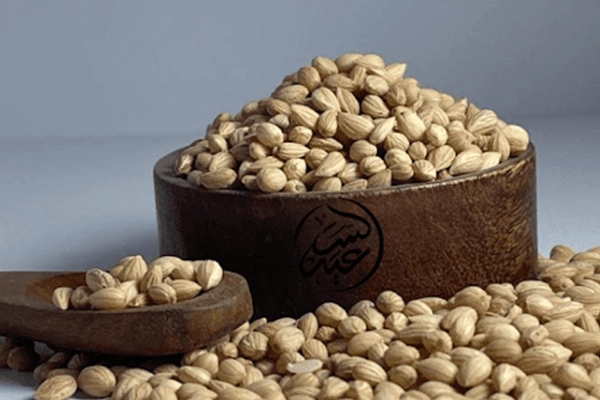
Scientific Research & Modern Studies on Mahleb
While the Mahleb health benefits have been acknowledged in traditional medicine for centuries, scientific research into this unique seed is still emerging. However, early studies are beginning to validate many of the wellness claims passed down through generations.
Some in vitro and animal studies have examined the bioactive compounds in Mahleb, particularly its antioxidant and anti-inflammatory properties. One study published in a Turkish pharmacology journal identified significant levels of phenolic acids, including coumarin derivatives, which may contribute to reduced oxidative stress and inflammation.
Additionally, Mahleb’s antibacterial potential has been tested against common foodborne pathogens, with promising results. Researchers found that Mahleb extracts showed moderate inhibitory effects on bacterial growth — a feature that may explain its traditional use in digestive remedies and natural tonics.
Another area of interest is the seed’s nutritional content, especially its mix of essential minerals, unsaturated fats, and fiber. These components are consistent with other functional foods known to support heart, bone, and metabolic health. While clinical trials are limited, the nutrient profile strongly supports many of the benefits of Mahleb seed observed in traditional use.
There is also increasing interest in studying Mahleb’s role in blood sugar regulation. Some comparative analyses have shown that cherry seeds, including Mahleb, may influence glycemic response due to their fiber and oil content. This aligns with the belief that Mahleb nutrition contributes to smoother digestion and more stable blood glucose levels.
Though more research — especially human trials — is needed, the growing body of scientific inquiry reinforces the idea that Mahleb is not only a culturally rich spice, but also a promising subject for modern wellness and preventive nutrition.
How to Safely Add Mahleb to Your Diet
While the Mahleb health benefits are impressive, it’s important to know how to incorporate this spice into your daily routine safely and effectively. Like many potent plant-based ingredients, moderation and proper preparation are key.
The first thing to note is that Mahleb should always be freshly ground. The seeds are extremely hard and need to be cracked open to access the inner kernel. Once ground, the powder can be added to a variety of dishes — both sweet and savory. Whole seeds retain their natural oils and Mahleb nutrition far better than pre-ground alternatives.
A typical serving size is ¼ to ½ teaspoon per recipe, especially in baked goods like breads, cookies, and cakes. This small amount is enough to bring out its signature aroma without overpowering the dish. The flavor works particularly well with ingredients like honey, nuts, cardamom, and rosewater.
If you’re just starting out, try mixing Mahleb with warm milk, sprinkling it over porridge or yogurt, or adding it to spice blends for roasted vegetables or rice. Some people even enjoy it in herbal teas or lattes, where it brings a floral, slightly almond-like note to the drink.
Despite its long history of safe use, Mahleb contains small amounts of coumarin, a naturally occurring compound also found in cinnamon and tonka beans. In large amounts, coumarin may affect liver function, so it’s best to stick to culinary quantities — especially for pregnant women or individuals with liver conditions.
Buying from a reputable source is also essential. At mehlow.com, we provide high-quality, food-safe Mahleb harvested, processed, and packaged with care — making it easy for you to enjoy the full benefits of Mahleb seed without compromise.
In summary, when used correctly and consistently, Mahleb is a flavorful, functional addition to any wellness-centered diet.
FAQ about Mahleb Benefits
What are the top Mahleb health benefits?
Mahleb may support digestion, reduce inflammation, promote heart health, and provide antioxidants. It’s also a source of minerals like calcium and iron.
Is Mahleb good for digestion?
Yes, Mahleb contains natural fiber and plant compounds that help regulate bowel movements, support gut bacteria, and reduce bloating.
Does Mahleb help with blood sugar or cholesterol?
Early research suggests Mahleb may support stable blood sugar levels and improve cholesterol balance due to its fiber and healthy fat content.
What nutrients are in Mahleb?
Mahleb nutrition includes fiber, monounsaturated fats, calcium, magnesium, iron, and antioxidants such as coumarin and flavonoids.
Can I eat Mahleb every day?
Yes — in small culinary amounts (¼ to ½ tsp per day), Mahleb is safe for most people and may support long-term wellness when used consistently.
Are there any side effects of Mahleb?
In large amounts, Mahleb may affect liver function due to its coumarin content. Stick to small culinary doses and consult a doctor if you have liver concerns.
Where can I buy high-quality Mahleb?
You can order fresh, food-grade Mahleb directly from mehlow.com, where it’s produced and packaged to meet export-quality standards.

